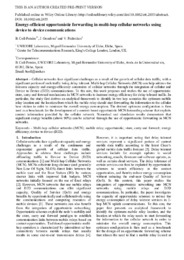Por favor, use este identificador para citar o enlazar este ítem:
https://hdl.handle.net/11000/5100Registro completo de metadatos
| Campo DC | Valor | Lengua/Idioma |
|---|---|---|
| dc.contributor.author | Coll Perales, Baldomero | - |
| dc.contributor.author | Gozalvez, Javier | - |
| dc.contributor.author | Friderikos, Vasilis | - |
| dc.contributor.other | Departamentos de la UMH::Ingeniería de Comunicaciones | es |
| dc.date.accessioned | 2019-04-04T08:16:56Z | - |
| dc.date.available | 2019-04-04T08:16:56Z | - |
| dc.date.created | 2014-08-11 | - |
| dc.date.issued | 2019-04-04 | - |
| dc.identifier.issn | 2161-3915 | - |
| dc.identifier.uri | http://hdl.handle.net/11000/5100 | - |
| dc.description.abstract | Cellular networks face significant challenges as a result of the growth of cellular data traffic, with a significant portion of such traffic being delay tolerant. Multi-hop Cellular Networks (MCN) can help address the foreseen capacity and energy-efficiency constraints of cellular networks through the integration of cellular and Device to Device (D2D) communications. To this aim, this work proposes and studies the use of opportunistic store, carry and forward mechanisms in MCN networks to increase energy efficiency for delay tolerant traffic. In particular, the study first derives an analytical framework to identify in two hop scenarios the optimum mobile relay location and the location from which the mobile relay should start forwarding the information to the celular base station in order to minimize the overall energy consumption. The derived optimum configuration is then used as a benchmark for the development of a context-based opportunistic MCN forwarding scheme that exploits context information provided by the cellular network. Numerical and simulation results demonstrate that significant energy benefits (above 90%) can be achieved through the use of opportunistic forwarding in MCN networks. | es |
| dc.description.sponsorship | This work is supported in part by the Spanish Ministry of Economy and Competitiveness and FEDER funds (TEC2011-26109), | en |
| dc.description.sponsorship | and the Local Government of Valencia with reference ACIF/2010/161 and BEFPI/2012/065. | en |
| dc.description.sponsorship | The work is also partially supported by the FP7 ITN CROSSFIRE project | en |
| dc.format | application/pdf | en |
| dc.format.extent | 14 | es |
| dc.language.iso | eng | es |
| dc.rights | info:eu-repo/semantics/openAccess | en |
| dc.subject | Multi-hop cellular networks (MCN); | en |
| dc.subject | mobile relay | en |
| dc.subject | opportunistic | en |
| dc.subject | store | en |
| dc.subject | carry and forward | en |
| dc.subject | energy efficiency | en |
| dc.subject | device to device (D2D). | en |
| dc.subject.other | 621.3 - Ingeniería eléctrica. Electrotecnia. Telecomunicaciones | es |
| dc.title | Energy-efficient opportunistic forwarding in multi-hop cellular networks using device to device communications | en |
| dc.type | info:eu-repo/semantics/article | en |
| dc.identifier.doi | 10.1109/VTCFall.2012.6399063 | - |
| dc.relation.publisherversion | https://doi.org/10.1109/VTCFall.2012.6399063 | - |

Ver/Abrir:
14-Energy-efficient opportunistic....pdf
607,72 kB
Adobe PDF
Compartir:
 La licencia se describe como: Atribución-NonComercial-NoDerivada 4.0 Internacional.
La licencia se describe como: Atribución-NonComercial-NoDerivada 4.0 Internacional.
.png)